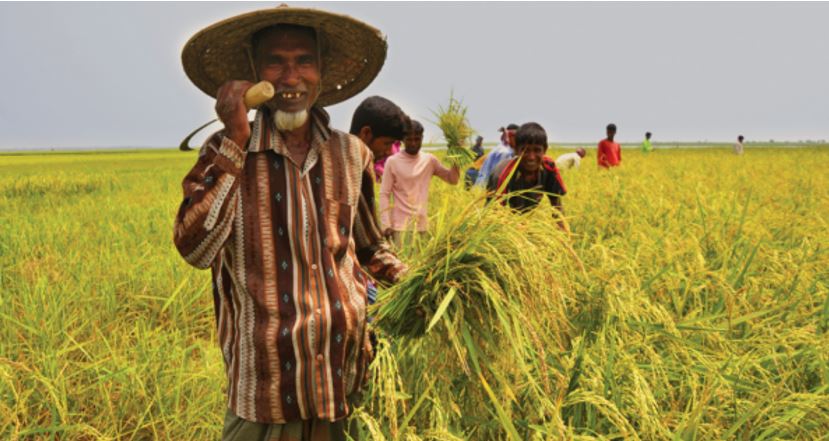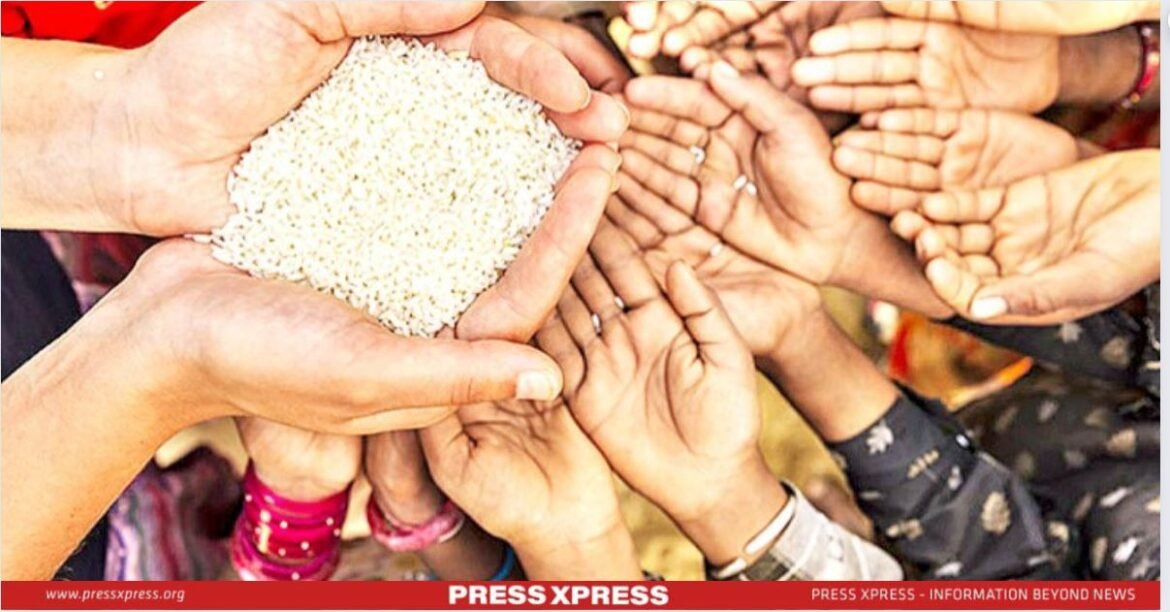Bangladesh must prioritize adaptive strategies and sustainable practices to combat climate change’s impact on food security, ensuring resilience and productivity in the face of changing climate conditions
Bangladesh, a nation grappling with the severe impacts of climate change, has emerged as a frontrunner in ensuring food security despite the mounting challenges posed by global conflicts and environmental crises. A recent report by the Grantham Research Institute on Climate Change and the Environment of the London School of Economics (LSE) highlights Bangladesh’s historical efforts and the emerging dual crisis the country faces in its pursuit of food security.
You can also read: Bangladesh Belongs to World’s Food Waste Top Club
Transformative Measures Towards Food Security
Bangladesh has made significant strides in fortifying food security through increased food grain production, particularly in rice, enhanced infrastructure, and more efficient food distribution mechanisms. This progress has been facilitated by the liberalization of agricultural markets, marked by elimination of food rationing and the dismantling of monopolies in food grain imports and exports.

In line with the ambitious target of a 50% increase in food grain production by 2030, outlined in the 8th Five-Year Plan (2021-2025), the Government of Bangladesh is actively engaged in expanding cultivated land by 10%, improving irrigation facilities by 15%, and promoting the adoption of high-yield seed varieties and fertilizers.
Nutrition security is becoming increasingly achievable, thanks to the significant rise in vegetable production since independence. Vegetable exports have surged, encompassing over 70 varieties, while agricultural exports recently surpassed the US $1billion mark.
In efforts to facilitate trade, import duties and fees on non-fragrant parboiled and white rice were slashed to 15.25% in December 2022. Furthermore, commercial banks were encouraged to support rice and wheat importers through minimal margin letters of credit.
Bangladesh boasts leading positions in fish production globally, particularly in Hilsa and Tilapia. Accessible fish prices have doubled individual fish consumption over the past decade, contributing to food security.

The Dual Crisis: Climate Change and Global Conflict
Climate change presents a grave threat to global food security, with Bangladesh being particularly vulnerable. The ongoing Russia-Ukraine conflict has exacerbated the challenge, leading to significant increases in the prices of staple foods, fuel, and fertilizers. This has raised concerns about rising poverty levels and worsening food insecurity in the country.
Bangladesh’s long-standing battles with cyclones, droughts, and floods are now intensified by climate change, resulting in more frequent and severe extreme weather events. The dual challenge of increased flooding and heightened extreme heat days compounds the issues, leading to reduced crop yields, livestock health problems, altered pest and disease distribution, and a decrease in the agricultural labor supply. Consequently, this leads to income reduction, limiting households’ ability to afford sufficient nutritious food.

Progress and Challenges in Ensuring Food Security
Despite the challenges, Bangladesh has made significant strides in improving food production and security, with positive trends in food security measures. Professor Elizabeth Robinson, Director of the Grantham Research Institute, London School of Economics, acknowledges Bangladesh’s remarkable progress in enhancing food and nutrition security while emphasizing the increasing difficulty in making further improvements due to climate change.
The report highlights the potential impact of climate change on food insecurity in Bangladesh. Under a catastrophic climate change scenario (3.6°C temperature increase by 2100), the proportion of Bangladeshi people suffering from moderate to severe food insecurity is projected to increase by nearly 5% between 2021-2040. However, if the Paris Agreement target of limiting temperature rise to well below 2°C is achieved, the increase in food insecurity would be limited to 4.4% during the same period. This underscores the importance of strong global action to mitigate climate change, as it will have clear food security benefits for countries like Bangladesh.
Evolution of Policies and Ongoing Commitment
Bangladesh’s journey to ensure food security has evolved over the years, with challenges and policy adjustments along the way. Since 1971, the focus on agricultural development for self-sufficiency faced hurdles, prompting a comprehensive approach after the 1974 famine. Safety nets, such as Food for Work (FFW) and Test Relief (TR) schemes, have addressed accessibility issues and contributed to stable food supplies.
The National Agricultural Policy (1999) and National Food Policy (2006) have emphasized sustainability and nutritional enhancement. However, global food price hikes in 2007–08 increased poverty, and recent setbacks, including the Russia–Ukraine conflict and escalating climate change impacts, pose renewed challenges to food security. The evolution of policies reflects Bangladesh’s ongoing commitment to addressing these challenges, emphasizing resilience and adaptability in the face of global and climatic uncertainties.

Future Policy Implications and Recommendations
The Bangladeshi government is prioritizing adaptation and resilience in response to climate change impacts, linking food security with climate resilience. Policies such as the 2008 Bangladesh Climate Change Strategy and the National Adaptation Plan (NAP) of 2023–2050 emphasize climate-smart agricultural practices and sustainable farming methods.
Experts recommend that Bangladesh embrace climate-smart agriculture, incorporating saline-tolerant crops, aquaculture, resilient rice varieties, agroforestry, and sustainable land management. Government initiatives like shrimp aquaculture and the System of Rice Intensification (SRI) signify progress. The National Food and Nutrition Security Policy (2023–2050) stresses the importance of diverse diets, while climate-smart technologies enhance nutrient-dense crops and safety nets aid affordability.
Conclusion
As Bangladesh continues to face the challenges posed by climate change and its impact on food security, experts urge concerted efforts from policymakers, researchers, and stakeholders to adopt adaptive strategies and prioritize sustainable practices. Despite the progress made, increased efforts, including extended research, targeted consumer protection, and improved healthcare access, are necessary to address the rising temperatures. Although these investments come with associated costs, they hold the promise of a more resilient and productive population amidst changing climate conditions.


